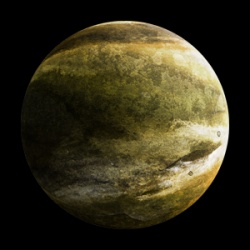|
|
| Line 38: |
Line 38: |
| [[Category:Former Taldryan territories]] | | [[Category:Former Taldryan territories]] |
| [[Category:Planets]] | | [[Category:Planets]] |
| [[Category:Historic Taldryan Articles]]
| |
Latest revision as of 06:08, 18 December 2018

|
| Altur
|
|
Expansion Region
|
|
Kr'Tal System
|
|
Kr'Tal
|
- Alturis
- Monak
- Cefath
- Winrak
- Dolta
|
|
477 Standard Days
|
|
Adaptable
|
|
30,703 meters
|
|
Type IV
|
|
Standard (0.90 Standard)
|
|
Gas
|
|
|
Altur currently resides in the Kr'Tal System, which is currently under control by Taldryan. It is the fifth orbit around the planet's star, Kr'Tal, and is a gas giant.
History
Violent storms and cyclones within the depths of the Atmosphere are caused by the intense rotational forces caused by the planet’s 18 standard hour day. The atmosphere, consisting of many heavy gases which can be refined for use in starships, is of great interest to Taldryan. It was made a priority by then Consul Kir Katarn to harvest these gases after the exodus. Permanent refineries and harvesting stations cling to a low orbit around the planet collecting the precious materials for use within the House and to sell for profit.
The gases harvested in Altur are sufficient to fuel and power the entirety of the Taldryan Expansionary Force and provide for a surplus stockpile, held in various locations, in the event of emergency.
Moons
Alturis is almost imperceptible next to its mother planet at 3,639m wide. Monak and Cefath are nearly identical in size at 5,987m and 4,643m wide each. Winrak is large enough at 12,019 meters in diameter to have gravity nearly that of standard (.91g) and is also the site of a secret hangar complex for the discrete use of the Summit. Dolta orbits Altur elliptically, but is small enough at 3,998m in diameter that it doesn’t cause any gravitational stress to its stellar neighbors.